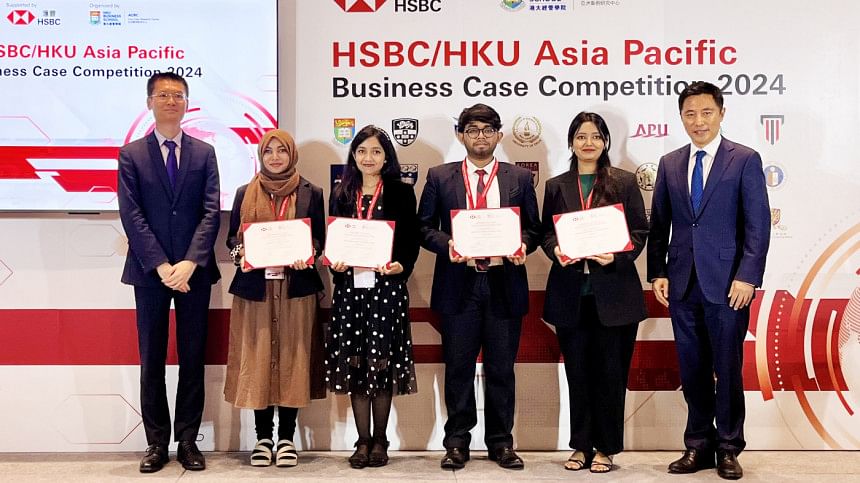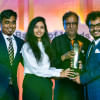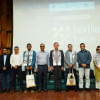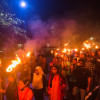From Dhaka to Hong Kong: Navigating business challenges on a global stage

As a student of the Institute of Business Administration (IBA), Dhaka University (DU), I have always been intrigued by business competitions and the idea of tackling real-world business challenges while sharpening my analytical skills. Little did I know that this would one day culminate in a defining moment – winning the HSBC-IBA Business Case Competition and earning the opportunity to represent Bangladesh on the global stage in Hong Kong.
This experience stands out not only as a milestone in my academic life but also as a transformative journey of personal growth, teamwork, and gaining invaluable insights into international business dynamics.
The road to Hong Kong was not just about the thrill of competition; it was a profound learning experience that stretched beyond textbooks and classrooms. It tested our abilities to think critically under pressure, collaborate effectively as a team, and present our ideas with clarity and conviction. These skills are not merely academic exercises but essential qualities for thriving in today's competitive business environment.
In this article, I look back at this amazing journey and the preparation that went behind it.
Competition format
The HSBC-IBA Business Case Competition is an intense, high-pressure test of business insight, creativity, and presentation skills. The format is simple yet challenging – participants are given four hours (three hours in the international round) to solve a business case with no access to any electronic device or the internet. Instead, we had to rely entirely on our knowledge, analytical skills, and creativity.
During those three hours, we drew our slides on paper, which was a unique and somewhat nostalgic experience. It forced us to think more carefully about how to present our ideas clearly and succinctly. The presentation itself lasts 10 minutes in the national round and 20 minutes in the international round, followed by a rigorous Q&A session with the judges. This part of the competition is crucial as it tests our solution and ability to defend and justify our decisions under pressure.
From my experience, the most important aspect of getting to the solution is problem identification. Understanding the core issue at hand and how our proposed solution addresses it efficiently is vital. The judges are looking for quality over quantity – fewer, well-thought-out solutions with a significant impact and a thorough cost-risk analysis are far more valuable than numerous superficial ideas. This was a lesson in strategic thinking and precision.
Building a winning team
A key component of success in such competitions is building a strong, cohesive team. Our team was composed of individuals with complementary skills. I believe it is crucial to focus on individual strengths and how they contribute to the overall synergy of the team.
Ideally, you should have members who excel in different areas: problem analysis, industry knowledge, financial acumen, and most importantly, presenting and handling Q&A. This diversity in skills would allow you to approach problems from multiple angles and come up with well-rounded solutions. Effective communication and collaboration are the pillars of a winning team.
We spent a substantial amount of time discussing, debating, and refining our ideas, ensuring that everyone was on the same page and that our final presentation was coherent and compelling. Trust and mutual respect within the team are also essential, as they enable open and honest discussions, which are crucial for developing the best possible solutions.
Preparing for the Competition
Preparation for the competition was intense and thorough. We practised previous Harvard Business School (HBS) and Asia Case Research Centre (ACRC) cases, which helped us get familiar with the format and types of problems we might encounter. Each practice session was followed by a review where we got our solutions checked by seniors or mentors. Their feedback was invaluable, providing us with different perspectives and helping us refine our approaches.
One of the most important aspects of our preparation was learning to manage our time effectively. With only four hours to solve the case, every minute counts. We developed a structured approach to divide our time between understanding the problem, brainstorming solutions, and preparing our presentation. This time management skill was crucial during the actual competition.
The Hong Kong experience
Representing Bangladesh on an international stage in Hong Kong was a truly remarkable experience. This was my first time visiting Hong Kong, and it is unlike the other Asian cities I have been to. The city is a blend of modernity and tradition, with its towering skyscrapers, bustling markets, and serene temples. The competition was held at the University of Hong Kong (HKU), and the atmosphere was electric. I still remember the adrenaline rush of solving the case in our hotel room and running to the venue across the street.
The cultural night was particularly memorable. Dressed in traditional attire, we had the opportunity to showcase our culture through performances. It was a vibrant and joyous event, fostering a sense of global community and mutual respect.
The competition itself was intense, but the experience was invaluable. The extended 20-minute presentation and the subsequent Q&A session were challenging, but they provided a real taste of the high standards expected in international business competitions. The feedback from the judges was constructive and gave us insights into areas for improvement. The knowledge we received in the mentorship was invaluable and opened a new window of business analysis.
Exploring Hong Kong in our free time was an adventure. From visiting iconic landmarks like Victoria Harbour and the HSBC Headquarters to sampling local delicacies from convenience stores, every moment was filled with discovery and excitement. The city's blend of Eastern and Western influences creates a unique and vibrant atmosphere and I particularly loved the contrast between New York style skyscraper and harbour views.
Building connections
The competition kicked off with an exhilarating "Amazing Race" on our first day. Teams were formed with students from various countries, each eager to explore the city's iconic landmarks while striving to win the challenge. It was a thrilling blend of competition and cultural exploration as we raced through Hong Kong's bustling streets, navigated its efficient public transport system, and solved clues that led us to hidden gems and historical sites.
Despite the competitive spirit, the experience fostered bonds of friendship and camaraderie among participants from diverse backgrounds.
One of the most significant takeaways from this experience was the opportunity to build a network of friends and professional contacts. We shared our experiences, discussed business trends, and learned from each other's cultures and practices. It was really inspiring to see so many talented individuals, each with unique perspectives and approaches to solving business problems.
Additionally, connecting with professionals from HSBC was a valuable opportunity. Their insights into the banking and finance industry were enlightening, and I gained a better understanding of the skills and knowledge required to succeed in this field. They shared their career insights and provided advice, making the overall experience more empowering.
Importance of Business Competitions
Business competitions are an essential part of academic life. They offer a platform to apply classroom concepts to real-world business problems, bridging the gap between theory and practice. These competitions develop critical skills such as analytical thinking, problem-solving, teamwork, and effective communication. Moreover, they provide an opportunity to network with industry professionals and peers from around the world, creating connections that can be valuable throughout one's career. The experience of competing at an international level also builds confidence and resilience, qualities that are crucial in the professional world.
Reflecting on my time in Hong Kong, I am grateful for the opportunity to represent Bangladesh on such a prestigious platform. The experience has enriched my understanding of international business dynamics, enhanced my confidence in tackling complex challenges, and broadened my perspective on global collaboration. It is a chapter in my academic journey that I shall always cherish.
The author is a Finance major at IBA, DU.

 For all latest news, follow The Daily Star's Google News channel.
For all latest news, follow The Daily Star's Google News channel. 









Comments